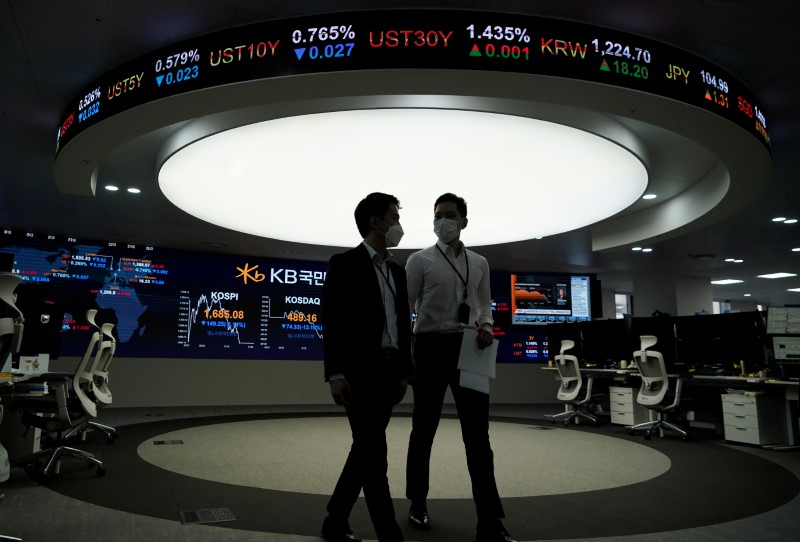This post was originally published on this site
https://i-invdn-com.akamaized.net/trkd-images/LYNXMPEG2Q0PM_L.jpg
MUMBAI/SEOUL (Reuters) – Crashing markets are driving the biggest rush from Asian retail investors into stocks in a decade or more, brokers say, as bargain-hunting and a fear of missing out prompts a scramble to “buy the dip”.
Even as global coronavirus infections and deaths continue to mount and more companies issue profit warnings, stockbroker switchboards from Sydney to Singapore have lit up with calls from erstwhile punters wanting to invest.
Indian brokerages say they have never signed on so many new customers so quickly, while deposits at their South Korean peers have jumped to a record high as investors hunt for bargains after a $12 trillion wipeout in world stocks.
“If people were waiting for a pullback, well they got it and then some,” said Chris Brankin, chief executive at brokerage TD Ameritrade in Singapore, where a 50% monthly jump in new accounts was the best since setting up there nine years ago.
“The one thing that has been difficult for us, is that as soon as people register for an account, they say ‘Can I trade now?’ I’m like…it’s a couple-day process to be able to get the account open and then get money into it.”
Driving the interest has been wall-to-wall coverage of both the coronavirus crisis and a plunge in global markets.
About a fifth of the value of world stocks has been lost in the past six weeks and no asset class has been spared. Many small investors seem to feel this is an unrivalled opportunity – particularly as markets have rallied hard in the last few days.
Google (NASDAQ:GOOGL) searches for the bargain-hunter’s catchcry, “buy the dip,” hit an all-time high on Wednesday, Google Trends data shows.
And where Asian indexes have fallen the furthest, interest from mum-and-pop investors has jumped the most as they deploy long-held savings or draw down loans to buy shares.
In India, brokerage Zerodha has already opened a record 140,000 new accounts this month – double the average. The S&P Sensex index’s (BSESN) 30% drop since January makes it one of the world’s worst performing markets.
CommSec, Australia’s largest retail broker, said account openings had increased fourfold in March. Brokers in Manila, Hong Kong, Bangkok, Tokyo and Jakarta reported surges as well.
In Korea, where the benchmark Kospi (KS11) is down by a quarter since January, retail investors lifted their broker deposits 53% to a record 41 trillion won ($34 billion).
“This is the best opportunity I have seen in 10 years to get into stocks,” said Cho Hyun-suk, a 40-year old office worker in Seoul, who had been steering clear of the market since the global financial crisis.
“I was a fresh graduate when many of the mutual funds just halved in value, too many. I plan to make a big investment with my seed money I have been saving up, at the right timing,” she said, without disclosing the size of her planned purchases.
Investors have looked to previous crises for clues on a rebound.
After the 2002-2003 SARS outbreak, which was mostly confined to Asia and hit Asia’s markets hardest – the rebound was sharp. Hong Kong’s Hang Seng index (HSI) dropped 18% in about four months, then surged by almost a third in the second half of 2003. The decline in the 2008/2009 financial crisis and the recovery both took much longer. The MSCI All-Country index (MIWD00000PUS) lost 56% over 10 months, with plenty of false dawns along the way. It was nearly five-and-a-half years before it regained 2008 levels.
Falls over the past few weeks, though, have outpaced even Wall Street’s 1929 crash.
The breadth and scale of the lockdowns and business closures across the globe are also unprecedented, prompting governments to pump in trillions of dollars in support and central banks to slash interest rates, fuelling the supply of cheap cash.
NO WARREN BUFFETS
It is less clear what exactly these investors are doing with their money, though blue chips at home and abroad are common themes.
In China, where the number of stock trading accounts rose nearly 12% through February, inflows have swamped funds that facilitate international investment.
Moleonoto The, CEO of Indonesian brokerage IndoPremier, said some clients who usually invested through mutual funds now want to buy big-cap stocks directly.
TD Ameritrade’s Brankin said many Asian investors were hoping the hardest-hit travel and energy sectors may have hit bottom. Cruise line Carnival Corp (N:CCL), down 65% this year, has become one of the most popular buys.
Others though, were speculative, or seeking to hedge pension fund investments by making bets on further market falls.
“It is not Warren Buffet style buy and hold investing – it is short term,” said Louis Tse, managing director at Hong Kong based VC Asset Management, which also offers brokerage services.
It is also risky against a backdrop of increasingly dire news about the pandemic and a global recession analysts say is all but certain.
More than 24,000 people have died from the virus so far, three million people filed jobless claims in the United States last week and professional investors caution against calling the end of a bear market.
“It’s absolutely impossible to know when the bottom has been reached – ever,” said Oaktree Capital Management founder Howard Marks in a note to investors last week.
“I believe this is a good time to invest, although of course it may prove not to have been the best time.”

